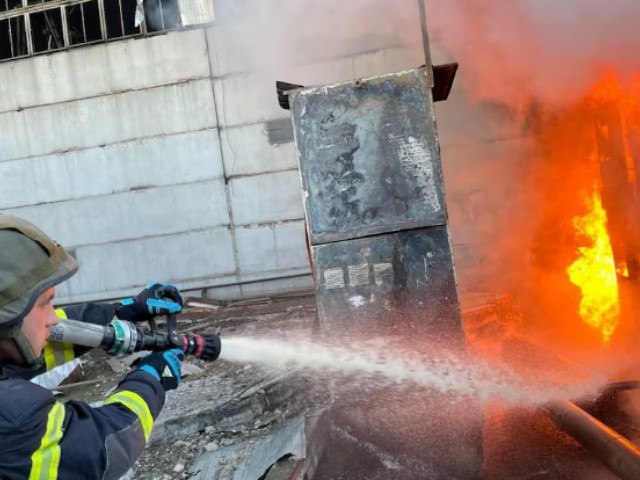Major Russian air strikes destroy Kyiv power plant, damage other stations
Strikes were a reply to Ukrainian attacks on Russia's oil, gas and energy facilities, Russian defence ministry said

Russian missiles and drones destroyed a large electricity plant near Kyiv and hit power facilities in several regions of Ukraine on Thursday, officials said, ramping up pressure on the embattled energy system as Kyiv runs low on air defences.
The major attack more than two years since Russia's full-scale invasion completely destroyed the Trypilska coal-powered thermal power plant near the capital, a senior official at the company that runs the facility told Reuters.
Russian President Vladimir Putin said Moscow had been obliged to launch the strikes in response to Ukrainian attacks in recent weeks on energy targets inside Russia.
Footage on social media showed a fire raging at the large Soviet-era facility and smoke belching from it. Reuters was able to confirm the location of the video as the Trypilska station.
"We need air defence and other defence support, not eye-closing and long discussions," President Volodymyr Zelenskiy said on Telegram, condemning the attacks as "terror".
The Russian defence ministry said it hit fuel and energy facilities in Ukraine in what it described as a massive retaliatory strike using drones and high-precision, long-range weapons from air and sea.
The strikes were a response to Ukrainian drone attacks on Russia's oil, gas and energy facilities, it said.
Putin told his ally, Belarusian Presudent Alexander Lukashenko that the attacks were a part of Russia's objective of the "demilitarisation" of Ukraine - one of the objectives of the Kremlin's 2022 invasion of its neighbour.
"Unfortunately, we observed a series of strikes on our energy sites recently and were obliged to respond," Russian news agencies quoted Putin as telling Lukashenko.
"The strikes on energy are linked in part with solving one of the tasks we set for ourselves, and that is demilitarisation. We believe above all that in this way we will affect Ukraine's military industrial complex and in a very direct way."
Russia, he said, had refrained from carrying out such attacks in winter "out of humanitarian considerations".
Kyiv's appeals for urgent air defence supplies from the West have grown increasingly desperate since Russia renewed its long-range aerial assaults on the Ukrainian energy system last month.
Foreign Minister Dmytro Kuleba was blunt in repeating calls for more US-made Patriot systems.
"What is there to discuss?" he told the Ukrainian state news agency Ukrinform during a visit to Slovakia. "There is only a single question: Give us Patriot systems! If we had Patriots, we would not have lost all of this today."
The attacks, which hammered thermal and hydroelectric power plants, sparked fears about the resilience of an energy system hobbled by a Russian air campaign in the war's first winter.
Ukraine's air force commander said air defences took down 18 of the incoming missiles and 39 drones. The attack used 82 missiles and drones in total, the military said.
The destroyed power plant outside Kyiv, a major supplier for the capital and Cherkasy and Zhytomyr regions, is the third and last facility owned by state-owned energy company Centrenergo.
"Everything is destroyed," Andriy Gota, head of the supervisory board of the company, said when asked about the situation at Centrenergo.
Biggest energy supplier near the capital
The Trypilska plant was the biggest energy facility near Kyiv and was built to have a capacity of 1,800 megawatts, more than the pre-war needs of Ukraine's biggest city.
The Ukrenergo grid operator said its substations and power generating facilities had been damaged in attacks on the regions of Odesa, Kharkiv, Zaporizhzhia, Lviv and Kyiv.
Ukraine's largest private electricity company DTEK, which lost 80% of its generating capacity in attacks on March 22 and March 29, said Russia's attacks hit two of its power stations.
On Thursday afternoon, Russian forces attacked a thermal power station in the Sumy region in northern Ukraine with guided bombs. The scale of damage was not immediately clear.
The strikes also attacked two underground storage facilities where Ukraine stores natural gas, including some owned by foreign companies, energy company Naftogaz said. The facilities continued to operate, it added.
"The situation in Ukraine is dire; there is not a moment to lose," said US ambassador Bridget Brink, adding that 10 missiles struck infrastructure in the Kharkiv area alone.
The grid operator issued a statement urging Ukrainians to minimise their use of electricity in the peak evening hours.
The region of Kharkiv, which borders Russia and already has long, rolling blackouts in place, was forced to cut electricity for 200,000 people, presidential aide Oleksiy Kuleba said.
Ukraine has warned it could run out of air defence munitions if Russia keeps up the intensity of its strikes and that it is already having to make difficult decisions about what to defend.
There has been a slowdown in Western assistance and a major US aid package has been blocked by Republicans in Congress.



















COMMENTS
Comments are moderated and generally will be posted if they are on-topic and not abusive.
For more information, please see our Comments FAQ